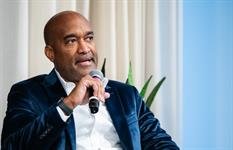The week started this Monday like many other post-holiday periods, especially in summer: sleepy and quiet with less incoming than usual and a slight feeling of ennui in the air.
But a text message late in the day changed all that. Something was afoot at Pfizer. And it presaged a few days of seismic stories across the comms and marketing industries.
Turns out that comms legend and former PRWeek Power List No. 1 Sally Susman was stepping down from her role as EVP and chief corporate affairs officer at Pfizer.
On its own, that was not a great surprise. Estée Lauder and American Express alum Susman’s 18-year tenure at the pharmaceutical giant spanned CEOs including Albert Bourla from 2016-the present, Ian Read from 2010-2016, and Jeff Kindler from 2006-2010. She might have reflected that this is as good a time as any to bow out.
She forged strong relationships at the top table and was the epitome of a senior counselor to the C-suite. She navigated the brutally difficult COVID-19 period with calm and authority, and dealt with attacks on the company by the likes of undercover video operator Project Veritas.
Susman also acted as a mentor to many people in the comms sector and will continue that work at The Aspen Institute’s Act III Leadership and Legacy Laureates program, which begins this fall, and mentoring young and rising leaders.
Tributes from the PR and business worlds to her contributions were fulsome. Richard Edelman called Susman “probably the most important figure in the communications industry for the last two decades.”
The public announcement of her leaving was made on LinkedIn, which is interesting in itself, and Bourla was effusive about Susman’s contribution to Pfizer.
“She navigated Pfizer’s interests through five U.S. presidential administrations and led stakeholder engagement during the pandemic with the successful Science Will Win campaign, which became a rallying cry for many,” he said. “She rebranded Pfizer’s visual identity and dedicated herself to public health. Her focus on the company’s reputation helped Pfizer consistently rank highly on reputational lists.”
He concluded by saying: “It has been my joy to know and work with Sally for many years. She is an adviser, confidant, mentor, advocate, and author, but to me she is also a very dear friend.”
That is high praise from the CEO of a $63 billion company and underlines what it means to be an effective modern head of communications.
But the announcement wasn’t just about Susman. Pfizer also revealed it is letting go of three senior members of its comms team, including CCO Ed Harnaga, and integrating its corporate affairs function into internal organizations where partnerships already exist. Amy Rose, VP of corporate communications, will lead comms, reporting to the office of the chairman, not CEO Bourla.
While praising Susman’s exceptional contributions to Pfizer over the past two decades, with the restructure announcement Bourla emphasized the need to “prioritize focus, speed, and simplify our work processes,” something all organizations are intent on doing.
It is sparking change everywhere. Also on Tuesday, Avoq CEO Nicole Cornish announced she was stepping down, having spent eight years at the firm. “With talented staff and a little bit of grit, the pieces are in place for new leaders to take the reins,” she explained, adding that she is also “looking forward to taking everything I’ve learned and helping more like-minded organizations and leadership teams achieve the same.”
On Wednesday, Omnicom PR Group CEO Chris Foster said 30-year veteran Mike Doyle would be leaving the group’s second-largest PR firm, Ketchum, with a search for a replacement CEO planned for “the appropriate time.”
Ketchum has had a tough couple of years and revenue was down 5% year over year in 2024 according to PRWeek’s Agency Business Report.
Foster said the change was not related to the impending acquisition of Interpublic Group by Omnicom and that it was “too early to tell what deck chairs might be moved,” but that he did “want a stronger Ketchum regardless of any IPG integration.”
Elsewhere in agency holding company-land, WPP issued a second profit warning of the year on Wednesday, downgrading its full-year organic revenue guidance after losing more big clients including Coca-Cola, Paramount and Mars, principally to its Arthour Sadoun-led rival Publicis Groupe. Shares dropped to their lowest levels over the past 12 months.
This is the scenario that new WPP CEO Cindy Rose will face when she takes over from incumbent Mark Read in September. The announcement on Thursday was not predicted by any of the pundits who have been speculating about Read’s successor.
Microsoft COO for global enterprise Rose has been on the WPP board since 2019 and becomes the first woman to lead one of the four major advertising and marketing services holding companies (not before time.) She will be hoping the only way is up from here but she has a formidable task ahead of her.
Also on Wednesday, Linda Yaccarino stepped down as CEO of X after a turbulent two-year run leading the Elon Musk-owned social platform.
Who knows what was the straw that broke the camel’s back – X is no longer a public company. But it could have been anything from certain options vesting, to some heinous recent antisemitic comments by X’s AI chatbot Grok that would test anyone’s resilience, to the platform’s founder’s move away from relying on advertising as a primary source of revenue – something core to Yaccarino’s expertise.
She made the – short – announcement on X, saying: “When @elonmusk and I first spoke of his vision for X, I knew it would be the opportunity of a lifetime to carry out the extraordinary mission of this company. I’m immensely grateful to him for entrusting me with the responsibility of protecting free speech, turning the company around, and transforming X into the Everything App.”
One can only imagine that the mercurial Musk must be a difficult person to follow Susman’s philosophy of speaking truth to power to be an effective communicator and leader.
So what was set to be a quiet few days suddenly transformed itself into one of the busiest news weeks of the year. Some senior execs will be spending the summer off while others will be stepping into significant new roles and getting straight down to business. All of them illustrate what a complex environment everyone is operating in where calm, clarity, agility and stakeholder and employee engagement are core.
In truth, the Pfizer announcement on Tuesday was a little curious, in that it combined news of Susman stepping down with the introduction of a completely new comms structure where the lead PR person doesn’t report directly to the CEO, and three very senior staffers are leaving in the fall.
Pfizer does not plan to replace Susman on a like-for-like basis. That would be impossible. VP of corporate communications Amy Rose will lead comms for Pfizer upon Susman’s departure, reporting to the office of the chairman as part of a broader streamlining at the company, not Bourla; moving areas of responsibility previously under corporate affairs to other parts of Pfizer.
“Sally Susman and I have decided to integrate the critical capabilities of our corporate affairs function into the Pfizer organizations where partnerships already exist,” said CEO Bourla in a memo to staff.
Susman wrote an excellent book on communications in 2023 called ‘Breaking Through’, partly dedicated to Bourla, which should be compulsory reading for anyone trying to get into the PR profession and for those who are already part of it.
She concludes one chapter by talking about courage and candor:
“Don’t hesitate. Have courage and let candor be your lifeblood. Deliver it with care and respect. Be brave. Have the guts and the knowledge to cut through the clutter of our noisy world by being direct, calm, and approachable. Stand for something. Take risks with bold declarations. Listen. Do what’s required to be forthright. Speak truth to power. Believe in straight talk. Know that candor makes us stronger and that, in some cases, it can even save lives.”
Those are wise words for the Pfizer comms team – and all PR pros – that Susman leaves in place for her successors to live by.
If they can use those mantras as their guiding North Star they have a chance of continuing Susman’s legacy and evolving Pfizer’s comms approach for the unpredictable and agile age in which all businesses now function.
But she will definitely be an extremely hard act to follow.















